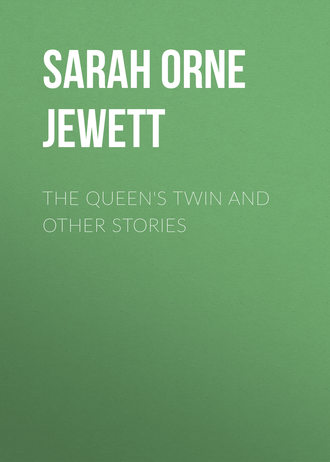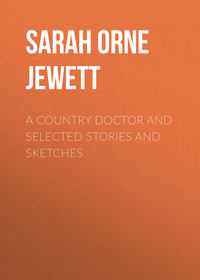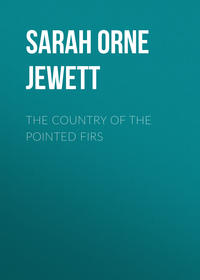 полная версия
полная версияThe Queen's Twin and Other Stories
"I owe everything to Miss Helena," said Martha, half aloud, as she sat alone by the window; she had said it to herself a thousand times. When she looked in the little keepsake mirror she always hoped to see some faint reflection of Helena Vernon, but there was only her own brown old New England face to look back at her wonderingly.
Miss Pyne went less and less often to pay visits to her friends in Boston; there were very few friends left to come to Ashford and make long visits in the summer, and life grew more and more monotonous. Now and then there came news from across the sea and messages of remembrance, letters that were closely written on thin sheets of paper, and that spoke of lords and ladies, of great journeys, of the death of little children and the proud successes of boys at school, of the wedding of Helena Dysart's only daughter; but even that had happened years ago. These things seemed far away and vague, as if they belonged to a story and not to life itself; the true links with the past were quite different. There was the unvarying flock of ground-sparrows that Helena had begun to feed; every morning Martha scattered crumbs for them from the side door-steps while Miss Pyne watched from the dining-room window, and they were counted and cherished year by year.
Miss Pyne herself had many fixed habits, but little ideality or imagination, and so at last it was Martha who took thought for her mistress, and gave freedom to her own good taste. After a while, without any one's observing the change, the every-day ways of doing things in the house came to be the stately ways that had once belonged only to the entertainment of guests. Happily both mistress and maid seized all possible chances for hospitality, yet Miss Harriet nearly always sat alone at her exquisitely served table with its fresh flowers, and the beautiful old china which Martha handled so lovingly that there was no good excuse for keeping it hidden on closet shelves. Every year when the old cherry-trees were in fruit, Martha carried the round white old English dish with a fretwork edge, full of pointed green leaves and scarlet cherries, to the minister, and his wife never quite understood why every year he blushed and looked so conscious of the pleasure, and thanked Martha as if he had received a very particular attention. There was no pretty suggestion toward the pursuit of the fine art of housekeeping in Martha's limited acquaintance with newspapers that she did not adopt; there was no refined old custom of the Pyne housekeeping that she consented to let go. And every day, as she had promised, she thought of Miss Helena,—oh, many times in every day: whether this thing would please her, or that be likely to fall in with her fancy or ideas of fitness. As far as was possible the rare news that reached Ashford through an occasional letter or the talk of guests was made part of Martha's own life, the history of her own heart. A worn old geography often stood open at the map of Europe on the light-stand in her room, and a little old-fashioned gilt button, set with a bit of glass like a ruby, that had broken and fallen from the trimming of one of Helena's dresses, was used to mark the city of her dwelling-place. In the changes of a diplomatic life Martha followed her lady all about the map. Sometimes the button was at Paris, and sometimes at Madrid; once, to her great anxiety, it remained long at St. Petersburg. For such a slow scholar Martha was not unlearned at last, since everything about life in these foreign towns was of interest to her faithful heart. She satisfied her own mind as she threw crumbs to the tame sparrows; it was all part of the same thing and for the same affectionate reasons.
V
One Sunday afternoon in early summer Miss Harriet Pyne came hurrying along the entry that led to Martha's room and called two or three times before its inhabitant could reach the door. Miss Harriet looked unusually cheerful and excited, and she held something in her hand. "Where are you, Martha?" she called again. "Come quick, I have something to tell you!"
"Here I am, Miss Pyne," said Martha, who had only stopped to put her precious box in the drawer, and to shut the geography.
"Who do you think is coming this very night at half-past six? We must have everything as nice as we can; I must see Hannah at once. Do you remember my cousin Helena who has lived abroad so long? Miss Helena Vernon,—the Honorable Mrs. Dysart, she is now."
"Yes, I remember her," answered Martha, turning a little pale.
"I knew that she was in this country, and I had written to ask her to come for a long visit," continued Miss Harriet, who did not often explain things, even to Martha, though she was always conscientious about the kind messages that were sent back by grateful guests. "She telegraphs that she means to anticipate her visit by a few days and come to me at once. The heat is beginning in town, I suppose. I daresay, having been a foreigner so long, she does not mind traveling on Sunday. Do you think Hannah will be prepared? We must have tea a little later."
"Yes, Miss Harriet," said Martha. She wondered that she could speak as usual, there was such a ringing in her ears. "I shall have time to pick some fresh strawberries; Miss Helena is so fond of our strawberries."
"Why, I had forgotten," said Miss Pyne, a little puzzled by something quite unusual in Martha's face. "We must expect to find Mrs. Dysart a good deal changed, Martha; it is a great many years since she was here; I have not seen her since her wedding, and she has had a great deal of trouble, poor girl. You had better open the parlor chamber, and make it ready before you go down."
"It is all ready," said Martha. "I can carry some of those little sweet-brier roses upstairs before she comes."
"Yes, you are always thoughtful," said Miss Pyne, with unwonted feeling.
Martha did not answer. She glanced at the telegram wistfully. She had never really suspected before that Miss Pyne knew nothing of the love that had been in her heart all these years; it was half a pain and half a golden joy to keep such a secret; she could hardly bear this moment of surprise.
Presently the news gave wings to her willing feet. When Hannah, the cook, who never had known Miss Helena, went to the parlor an hour later on some errand to her old mistress, she discovered that this stranger guest must be a very important person. She had never seen the tea-table look exactly as it did that night, and in the parlor itself there were fresh blossoming boughs in the old East India jars, and lilies in the paneled hall, and flowers everywhere, as if there were some high festivity.
Miss Pyne sat by the window watching, in her best dress, looking stately and calm; she seldom went out now, and it was almost time for the carriage. Martha was just coming in from the garden with the strawberries, and with more flowers in her apron. It was a bright cool evening in June, the golden robins sang in the elms, and the sun was going down behind the apple-trees at the foot of the garden. The beautiful old house stood wide open to the long-expected guest.
"I think that I shall go down to the gate," said Miss Pyne, looking at Martha for approval, and Martha nodded and they went together slowly down the broad front walk.
There was a sound of horses and wheels on the roadside turf: Martha could not see at first; she stood back inside the gate behind the white lilac-bushes as the carriage came. Miss Pyne was there; she was holding out both arms and taking a tired, bent little figure in black to her heart. "Oh, my Miss Helena is an old woman like me!" and Martha gave a pitiful sob; she had never dreamed it would be like this; this was the one thing she could not bear.
"Where are you, Martha?" called Miss Pyne. "Martha will bring these in; you have not forgotten my good Martha, Helena?" Then Mrs. Dysart looked up and smiled just as she used to smile in the old days. The young eyes were there still in the changed face, and Miss Helena had come.
That night Martha waited in her lady's room just as she used, humble and silent, and went through with the old unforgotten loving services. The long years seemed like days. At last she lingered a moment trying to think of something else that might be done, then she was going silently away, but Helena called her back. She suddenly knew the whole story and could hardly speak.
"Oh, my dear Martha!" she cried, "won't you kiss me good-night? Oh, Martha, have you remembered like this, all these long years!"
THE COON DOG
I
In the early dusk of a warm September evening the bats were flitting to and fro, as if it were still summer, under the great elm that overshadowed Isaac Brown's house, on the Dipford road. Isaac Brown himself, and his old friend and neighbor John York, were leaning against the fence.
"Frost keeps off late, don't it?" said John York. "I laughed when I first heard about the circus comin'; I thought 't was so unusual late in the season. Turned out well, however. Everybody I noticed was returnin' with a palm-leaf fan. Guess they found 'em useful under the tent; 't was a master hot day. I saw old lady Price with her hands full o' those free advertisin' fans, as if she was layin' in a stock against next summer. Well, I expect she 'll live to enjoy 'em."
"I was right here where I 'm standin' now, and I see her as she was goin' by this mornin'," said Isaac Brown, laughing, and settling himself comfortably against the fence as if they had chanced upon a welcome subject of conversation. "I hailed her, same 's I gener'lly do. 'Where are you bound to-day, ma'am?' says I.
"'I 'm goin' over as fur as Dipford Centre,' says she. 'I 'm goin' to see my poor dear 'Liza Jane. I want to 'suage her grief; her husband, Mr. 'Bijah Topliff, has passed away.'
"'So much the better,' says I.
"'No; I never l'arnt about it till yisterday,' says she; an' she looked up at me real kind of pleasant, and begun to laugh.
"'I hear he's left property,' says she, tryin' to pull her face down solemn. I give her the fifty cents she wanted to borrow to make up her car-fare and other expenses, an' she stepped off like a girl down tow'ds the depot.
"This afternoon, as you know, I 'd promised the boys that I 'd take 'em over to see the menagerie, and nothin' would n't do none of us any good but we must see the circus too; an' when we'd just got posted on one o' the best high seats, mother she nudged me, and I looked right down front two, three rows, an' if there wa'n't Mis' Price, spectacles an' all, with her head right up in the air, havin' the best time you ever see. I laughed right out. She had n't taken no time to see 'Liza Jane; she wa'n't 'suagin' no grief for nobody till she 'd seen the circus. 'There,' says I, 'I do like to have anybody keep their young feelin's!'"
"Mis' Price come over to see our folks before breakfast," said John York. "Wife said she was inquirin' about the circus, but she wanted to know first if they couldn't oblige her with a few trinkets o' mournin', seein' as how she 'd got to pay a mournin' visit. Wife thought 't was a bosom-pin, or somethin' like that, but turned out she wanted the skirt of a dress; 'most anything would do, she said."
"I thought she looked extra well startin' off," said Isaac, with an indulgent smile. "The Lord provides very handsome for such, I do declare! She ain't had no visible means o' support these ten or fifteen years back, but she don't freeze up in winter no more than we do."
"Nor dry up in summer," interrupted his friend; "I never did see such an able hand to talk."
"She's good company, and she's obliging an' useful when the women folks have their extra work progressin'," continued Isaac Brown kindly. "'T ain't much for a well-off neighborhood like this to support that old chirpin' cricket. My mother used to say she kind of helped the work along by 'livenin' of it. Here she comes now; must have taken the last train, after she had supper with 'Lizy Jane. You stay still; we 're goin' to hear all about it."
The small, thin figure of Mrs. Price had to be hailed twice before she could be stopped.
"I wish you a good evenin', neighbors," she said. "I have been to the house of mournin'."
"Find 'Liza Jane in, after the circus?" asked Isaac Brown, with equal seriousness. "Excellent show, was n't it, for so late in the season?"
"Oh, beautiful; it was beautiful, I declare," answered the pleased spectator readily. "Why, I did n't see you, nor Mis' Brown. Yes; I felt it best to refresh my mind an' wear a cheerful countenance. When I see 'Liza Jane I was able to divert her mind consid'able. She was glad I went. I told her I 'd made an effort, knowin' 'twas so she had to lose the a'ternoon. 'Bijah left property, if he did die away from home on a foreign shore."
"You don't mean that 'Bijah Topliff 's left anything!" exclaimed John York with interest, while Isaac Brown put both hands deep into his pockets, and leaned back in a still more satisfactory position against the gatepost.
"He enjoyed poor health," answered Mrs. Price, after a moment of deliberation, as if she must take time to think. "'Bijah never was one that scattereth, nor yet increaseth. 'Liza Jane's got some memories o' the past that's a good deal better than others; but he died somewheres out in Connecticut, or so she heard, and he's left a very val'able coon dog,—one he set a great deal by. 'Liza Jane said, last time he was to home, he priced that dog at fifty dollars. 'There, now, 'Liza Jane,' says I, right to her, when she told me, 'if I could git fifty dollars for that dog, I certain' would. Perhaps some o' the circus folks would like to buy him; they 've taken in a stream o' money this day.' But 'Liza Jane ain't never inclined to listen to advice. 'T is a dreadful poor-spirited-lookin' creatur'. I don't want no right o' dower in him, myself."
"A good coon dog 's worth somethin', certain," said John York handsomely.
"If he is a good coon dog," added Isaac Brown. "I would n't have parted with old Rover, here, for a good deal of money when he was right in his best days; but a dog like him 's like one of the family. Stop an' have some supper, won't ye, Mis' Price?"—as the thin old creature was flitting off again. At that same moment this kind invitation was repeated from the door of the house; and Mrs. Price turned in, unprotesting and always sociably inclined, at the open gate.
II
It was a month later, and a whole autumn's length colder, when the two men were coming home from a long tramp through the woods. They had been making a solemn inspection of a wood-lot that they owned together, and had now visited their landmarks and outer boundaries, and settled the great question of cutting or not cutting some large pines. When it was well decided that a few years' growth would be no disadvantage to the timber, they had eaten an excellent cold luncheon and rested from their labors.
"I don't feel a day older 'n ever I did when I get out in the woods thi way," announced John York, who was a prim, dusty-looking little man, a prudent person, who had been selectman of the town at least a dozen times.
"No more do I," agreed his companion, who was large and jovial and open-handed, more like a lucky sea-captain than a farmer. After pounding a slender walnut-tree with a heavy stone, he had succeeded in getting down a pocketful of late-hanging nuts which had escaped the squirrels, and was now snapping them back, one by one, to a venturesome chipmunk among some little frost-bitten beeches. Isaac Brown had a wonderfully pleasant way of getting on with all sorts of animals, even men. After a while they rose and went their way, these two companions, stopping here and there to look at a possible woodchuck's hole, or to strike a few hopeful blows at a hollow tree with the light axe which Isaac had carried to blaze new marks on some of the line-trees on the farther edge of their possessions. Sometimes they stopped to admire the size of an old hemlock, or to talk about thinning out the young pines. At last they were not very far from the entrance to the great tract of woodland. The yellow sunshine came slanting in much brighter against the tall trunks, spotting them with golden light high among the still branches.
Presently they came to a great ledge, frost-split and cracked into mysterious crevices.
"Here's where we used to get all the coons," said John York. "I have n't seen a coon this great while, spite o' your courage knocking on the trees up back here. You know that night we got the four fat ones? We started 'em somewheres near here, so the dog could get after 'em when they come out at night to go foragin'."
"Hold on, John;" and Mr. Isaac Brown got up from the log where he had just sat down to rest, and went to the ledge, and looked carefully all about. When he came back he was much excited, and beckoned his friend away, speaking in a stage whisper.
"I guess you 'll see a coon before you 're much older," he proclaimed. "I 've thought it looked lately as if there 'd been one about my place, and there's plenty o' signs here, right in their old haunts. Couple o' hens' heads an' a lot o' feathers"—
"Might be a fox," interrupted John York.
"Might be a coon," answered Mr. Isaac Brown. "I 'm goin' to have him, too. I 've been lookin' at every old hollow tree I passed, but I never thought o' this place. We 'll come right off to-morrow night, I guess, John, an' see if we can't get him. 'T is an extra handy place for 'em to den; in old times the folks always called it a good place; they 've been so sca'ce o' these late years that I 've thought little about 'em. Nothin' I ever liked so well as a coon-hunt. Gorry! he must be a big old fellow, by his tracks! See here, in this smooth dirt; just like a baby's footmark."
"Trouble is, we lack a good dog," said John York anxiously, after he had made an eager inspection. "I don't know where in the world to get one, either. There ain't no such a dog about as your Rover, but you 've let him get spoilt; these days I don't see him leave the yard. You ought to keep the women folks from overfeedin' of him so. He ought to 've lasted a good spell longer. He's no use for huntin' now, that's certain."
Isaac accepted the rebuke meekly. John York was a calm man, but he now grew very fierce under such a provocation. Nobody likes to be hindered in a coon-hunt.
"Oh, Rover's too old, anyway," explained the affectionate master regretfully. "I 've been wishing all this afternoon I 'd brought him; but I did n't think anything about him as we came away, I 've got so used to seeing him layin' about the yard. 'T would have been a real treat for old Rover, if he could have kept up. Used to be at my heels the whole time. He could n't follow us, anyway, up here."
"I should n't wonder if he could," insisted John, with a humorous glance at his old friend, who was much too heavy and huge of girth for quick transit over rough ground. John York himself had grown lighter as he had grown older.
"I 'll tell you one thing we could do," he hastened to suggest. "There 's that dog of 'Bijah Topllff's. Don't you know the old lady told us, that day she went over to Dipford, how high he was valued? Most o' 'Bijah's important business was done in the fall, goin' out by night, gunning with fellows from the mills. He was just the kind of a worthless do-nothing that's sure to have an extra knowin' smart dog. I expect 'Liza Jane 's got him now. Perhaps we could get him by to-morrow night. Let one o' my boys go over!"
"Why, 'Liza Jane 's come, bag an' baggage, to spend the winter with her mother," exclaimed Isaac Brown, springing to his feet like a boy. "I 've had it in mind to tell you two or three times this afternoon, and then something else has flown it out of my head. I let my John Henry take the long-tailed wagon an' go down to the depot this mornin' to fetch her an' her goods up. The old lady come in early, while we were to breakfast, and to hear her lofty talk you 'd thought 't would taken a couple o' four-horse teams to move her. I told John Henry he might take that wagon and fetch up what light stuff he could, and see how much else there was, an' then I 'd make further arrangements. She said 'Liza Jane 'd see me well satisfied, an' rode off, pleased to death. I see 'em returnin' about eight, after the train was in. They 'd got 'Liza Jane with 'em, smaller 'n ever; and there was a trunk tied up with a rope, and a small roll o' beddin' and braided mats, and a quilted rockin'-chair. The old lady was holdin' on tight to a bird-cage with nothin' in it. Yes; an' I see the dog, too, in behind. He appeared kind of timid. He 's a yaller dog, but he ain't stump-tailed. They hauled up out front o' the house, and mother an' I went right out; Mis' Price always expects to have notice taken. She was in great sperits. Said 'Liza Jane concluded to sell off most of her stuff rather 'n have the care of it. She 'd told the folks that Mis' Topliff had a beautiful sofa and a lot o' nice chairs, and two framed pictures that would fix up the house complete, and invited us all to come over and see 'em. There, she seemed just as pleased returnin' with the bird-cage. Disappointments don't appear to trouble her no more than a butterfly. I kind of like the old creatur'; I don't mean to see her want."
"They 'll let us have the dog," said John York. "I don't know but I 'll give a quarter for him, and we 'll let 'em have a good piece o' the coon."
"You really comin' 'way up here by night, coon-huntin'?" asked Isaac Brown, looking reproachfully at his more agile comrade.
"I be," answered John York.
"I was dre'tful afraid you was only talking, and might back out," returned the cheerful heavy-weight, with a chuckle. "Now we 've got things all fixed, I feel more like it than ever. I tell you there's just boy enough left inside of me. I 'll clean up my old gun to-morrow mornin', and you look right after your'n. I dare say the boys have took good care of 'em for us, but they don't know what we do about huntin', and we 'll bring 'em all along and show 'em a little fun."
"All right," said John York, as soberly as if they were going to look after a piece of business for the town; and they gathered up the axe and other light possessions, and started toward home.
III
The two friends, whether by accident or design, came out of the woods some distance from their own houses, but very near to the low-storied little gray dwelling of Mrs. Price. They crossed the pasture, and climbed over the toppling fence at the foot of her small sandy piece of land, and knocked at the door. There was a light already in the kitchen. Mrs. Price and Eliza Jane Topliff appeared at once, eagerly hospitable.
"Anybody sick?" asked Mrs. Price, with instant sympathy. "Nothin' happened, I hope?"
"Oh, no," said both the men.
"We came to talk about hiring your dog to-morrow night," explained Isaac Brown, feeling for the moment amused at his eager errand. "We got on track of a coon just now, up in the woods, and we thought we 'd give our boys a little treat. You shall have fifty cents, an' welcome, and a good piece o' the coon."
"Yes, Square Brown; we can let you have the dog as well as not," interrupted Mrs. Price, delighted to grant a favor. "Poor departed 'Bijah, he set everything by him as a coon dog. He always said a dog's capital was all in his reputation."
"You 'll have to be dreadful careful an' not lose him," urged Mrs. Topliff. "Yes, sir; he 's a proper coon dog as ever walked the earth, but he's terrible weak-minded about followin' 'most anybody. 'Bijah used to travel off twelve or fourteen miles after him to git him back, when he wa'n't able. Somebody 'd speak to him decent, or fling a whip-lash as they drove by, an' off he 'd canter on three legs right after the wagon. But 'Bijah said he wouldn't trade him for no coon dog he ever was acquainted with. Trouble is, coons is awful sca'ce."
"I guess he ain't out o' practice," said John York amiably; "I guess he 'll know when he strikes the coon. Come, Isaac, we must be gittin' along tow'ds home. I feel like eatin' a good supper. You tie him up to-morrow afternoon, so we shall be sure to have him," he turned to say to Mrs. Price, who stood smiling at the door.
"Land sakes, dear, he won't git away; you 'll find him right there betwixt the wood-box and the stove, where he is now. Hold the light, 'Liza Jane; they can't see their way out to the road. I 'll fetch him over to ye in good season," she called out, by way of farewell; "'t will save ye third of a mile extra walk. No, 'Liza Jane; you 'll let me do it, if you please. I 've got a mother's heart. The gentlemen will excuse us for showin' feelin'. You 're all the child I 've got, an' your prosperity is the same as mine."






